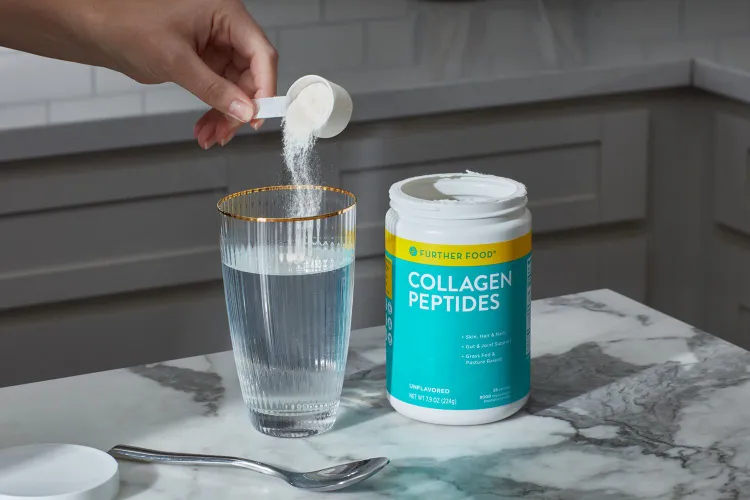One of the biggest buzzwords in the world of health, beauty and biohacking, collagen is everywhere. You’ll find collagen supplements, collagen drinks and skincare loaded with this wonder ingredient wherever you look.
However, despite collagen’s ubiquitousness, not all collagen is equal. Before you invest and start taking it, there are a few essential things everyone should know about how collagen is made, the different types of collagen and what it actually does.
Collagen is actually made by the human body. It’s a protein found in skin, hair and nails to joints, bones and other connective tissue. It’s essentially the structural glue that ensures the softness and elasticity of the whole body and there’s a lot of it.
But as we age, our collagen stores deplete and the collagen we have is of a lower quality than that of when we were younger. So skin all over the body might start to feel less full, joints might feel less lubricated and more prone to pain and that effortless glow might feel harder to achieve.
“Collagen ensures the cohesion, elasticity and regeneration of all of our connective tissues, as well as supporting hair, skin and nails, which is especially important as collagen starts to naturally decline as we age, and levels start to drop as early as our 20s”, explains naturopathic nutritionist Jess Shand.
Collagen also drops significantly after menopause, which is why so many people choose to supplement it early on to maintain through their thirties and top up those losses into their forties, fifties and sixties.
What we eat can help us produce collagen too. Facialist Jude Jackson suggests, “protein-rich foods like egg whites, meat, bone broth and chicken skin should be eaten alongside foods rich in vitamin C, such as citrus, kiwis and leafy green vegetables, and zinc and copper, which come from nuts and shellfish.”
But even if you’re eating a balanced diet of whole foods, supplementation can optimise collagen intake and if you follow a vegan or vegetarian diet, a supplement could fill gaps in your nutritional intake where you might not be consuming enough collagen-rich foods.
What is the best collagen?
There are actually numerous types of collagen – type one, two, three, four and five. They’re all found in the body and have different functions. Those categorised as types one and three are the most commonly found in supplements.
“Over 90 per cent of the collagen found in the body is type one”, explains nutritional therapist Maz Packham. “So supplementing with types one and three can support overall health where your diet may be lacking and collagen stores decrease with age.” But does this work?
Jackson explains that, “According to a 2022 study, a collagen supplement can improve connective tissue recovery and pain, meaning it supports resistance training and will hopefully support tissue as [we] age.”
However, not all collagen supplements are alike, and not all of them contain ample levels to support good health. You want to ensure you’re not only consuming the right type but also the right amount and in a way that suits your lifestyle.
We spoke with nutritional experts to find out which collagen products they’d personally recommend, how to take them and which might be best suited to differing diets and lifestyles. Each supplement was also tested by our wellbeing editor who shares her thoughts on what works and what doesn’t.
Read on for our comprehensive expert-informed list of the top collagen supplements, collagen drinks and other products containing this wellbeing-boosting ingredient for healthier hair, skin, nails, joints and more.
Why you can trust IndyBest reviews
Jess Shand, Maz Packham and Jude Jackson are experts on all things collagen – from its impact on gut health to its credentials for hair and skin support, they know what makes a quality, bioavailable product and what’s best avoided. Along with our cohort of nutritionists and skin health experts who keep up with the latest studies and science, our wellness editor Emilie Lavinia is an authority on wellbeing products. In her ten years of reporting on health, beauty and wellness, she’s put every collagen brand out there to the test and knows what separates marketing jargon from a quality supplement.












